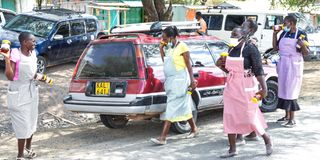From market sellers to millionaires; the making of Koriema women

Koriema Women members selling honey as they work towards pooling resources with an aim of forming a cooperative later in the year.
What you need to know:
- A group of women in the semi-arid Baringo County pooled resources to invest in infusing honey.
- Almost seven years later, the empowerment program is proving to be a life changer to more than 50 members of Koriema Women.
When a group of women in the semi-arid Baringo County pooled resources to invest in infusing honey, they had no idea the deal would turn into a giant enterprise that would transform their socio-economic livelihoods. They made a resolve, and literally moved away from the traditional pastoralism culture of their people.
Almost seven years later, the empowerment program is proving to be a life changer to more than 50 members of Koriema Women. They sell honey along the Kabarnet-Marigat Highway realising economic empowerment to earn a living and educate their children.
They have debunked the myth that women from that part of the country depend on their husbands wholly.
Smaller groups
To ensure they rip big from the honey business, the women in 2014, decided to form smaller groups with varying specialisations to expand the business.
“Koriema Women was established in 2014 as a table banking group for women who engaged in small business activities in the market. As time went by, however, we realised the need to come together, raise some money to use in the capital intensive honey selling business,” discloses Anne Ng’etich, the chairperson of Koriema Honey Packers.
At the beginning, they were only six, but as reality descended on most women, the group expanded. The women contributed Sh3,000 each, raising Sh20,000 as start-up capital to purchase honey from Tiaty in large quality.
“The initial capital from six women was Sh20,000 but this has gradually grown as we keep ploughing back our profits. Currently, we range between Sh500,000 to1,000,000,” says Lydia Kibet, another member.
“The idea was to create a platform to mobilise women and provide opportunities for them to start their own business and access market for the produce at competitive rates,” she adds.
The group attended a training offered by the Agricultural Sector Development Support Programme (ASDSP) in 2016, where they learnt how to convert the traditional mode of selling honey to one that added value.

Smile of an achiever: Felistus Kasitet, a member of Koriema Women Group at work.
Prior to this, the women sold honey along the road at Koriema, Baringo, in ordinary water bottles. Unfortunately, this meant they sold it cheaper and only to clients plying Kabarnet-Marigat highway, hence little income.
“If you want profit, be ready to take risks,” explains Ms Ng’etich, one of the members.
The mother of five went against the odds to invest in honey production when most of the society valued livestock and five years later, the business is paying off.
Koriema Women have divided themselves into five groups; purifiers, packers and stage sellers. They say they have become financially independent and no longer depend on their husbands.
Although Ms Ng’etich works on orders from her clients, she has not completely done away with selling her product at the bus stop.
“This is the readily available venture that allows me to balance my house chores with my business,” says Felistus Kasitet, another member who does purifying.
Apart from empowering themselves, they have also created employment opportunities for other people who help in product processing and packaging.
Bee-keeping
Baringo honey is of quality according to the women group. They say the region has good trees and a favourable tropical climate ideal for bee-keeping. The bee species found in this region is Apis Mellifera Yemenitica, commonly referred to as honeybee. It withstands and survives drought conditions and has high honey yield.
When the Kenya Top Bar Hive was introduced in 1979, there was need for farmers to adopt movable bar technology as a transition hive between the traditional log hive and the Langstroth hive.
Unfortunately, technology adoption has been slow among Kenyan bee-keepers. In the past, farmers kept their traditional beehives (log hives), on trees in expansive areas, largely unsettled, tapping nectar and pollen from the wild plant sources. Most bee-keepers in Baringo are still in it.
The Koriema Women plan to come up with a cooperative hopefully by the end of this year to enable them manage table banking schemes, where they advance loans to members at low interest rates. This will also enable them sustain operations.
“Access to financial credit remains our main challenge since it is our wish that more women join the group or form similar associations to empower them economically and overcome socio-economic challenges at family level,” says Pauline Kangogo.
They say the main challenge facing them in the honey business is the scarcity of honey during certain periods of the year, affecting pricing. They, however, maintain that Baringo remains their source for honey.
The group’s main objective is to empower other Small Medium Enterprises (SMEs) in the region to embrace a culture of accessing financial credit, for them to attain socio-economic prosperity.





